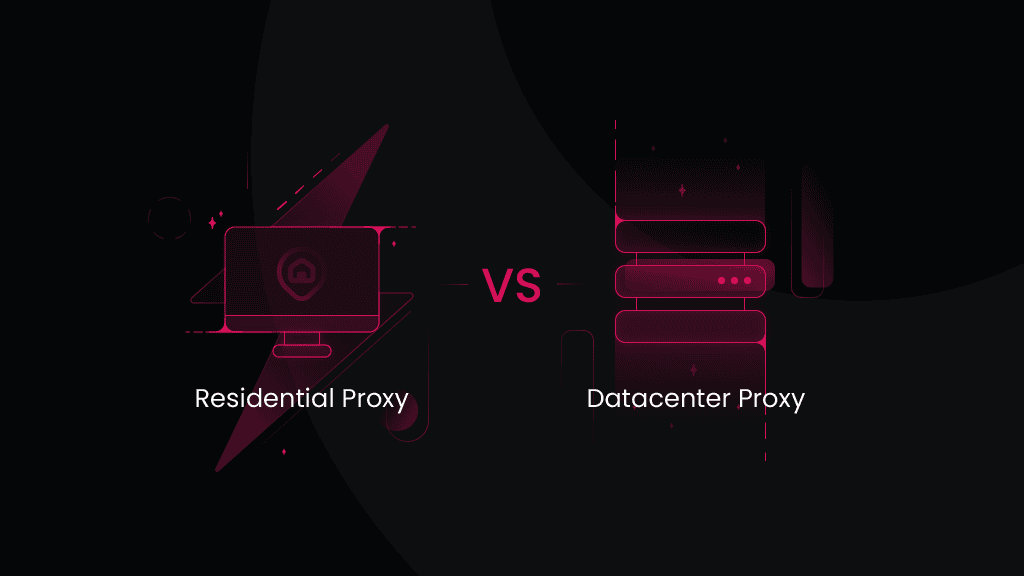Proxy Integration with OpenBullet
Boost your web and app testing efforts by integrating residential proxies into OpenBullet.
115M+
ethically-sourced IPs
#1
response time
99.86%
success rate
99.99%
uptime
<0.6s
response time
What is OpenBullet?
OpenBullet is a software tool widely recognized for its capabilities in testing and automating web applications with a highly customizable framework that allows users to implement various scenarios.
Framework customization
Tailor testing environments to meet your specific needs, optimizing the analysis of diverse web applications.
Data parsing and management
Streamline complex workflows by managing data extracted during tests with powerful parsing capabilities.
Multi-protocol support
Effortlessly use HTTP(S) and SOCKS5 protocols for various security testing scenarios.
Why residential proxies?

Residential proxies serve as intermediaries by offering users authentic IP addresses from real household devices on local networks. These proxies are ideal for tasks such as web scraping, multi-accounting, AdTech, and beyond.
Decodo provides high-quality residential proxies with a vast pool of 115M+ IPs spanning 195+ locations. Enjoy swift response times of <0.6 seconds, an impeccable success rate of 99.86%, and a flexible Pay As You Go option. New users can start with a 3-day free trial to test the service.
Set up Decodo proxies with OpenBullet
There are two official clients for OpenBullet 2: a web client (cross-platform) and a native client (Windows). Follow these instructions to get OpenBullet running on your system.
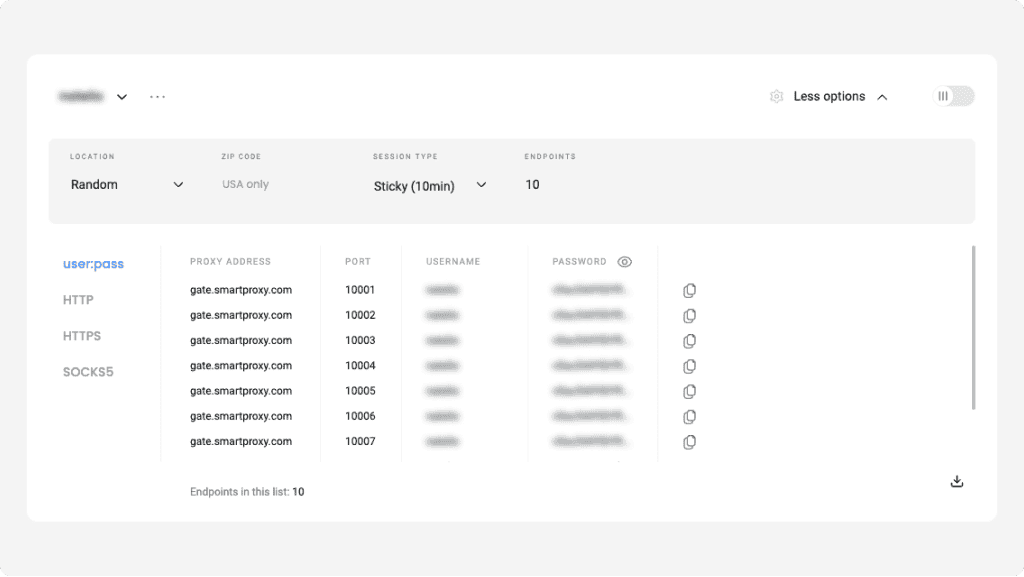
Getting residential proxies
Log in to your Decodo dashboard, find residential proxies by choosing Residential under the Residential Proxies column on the left panel, and select a plan that suits your needs. Then, follow these steps:
- Open the Proxy setup tab.
- Navigate to the Endpoint generator below.
- Configure the parameters. Set your authentication method, location, session type, and protocol.
- Select the number of proxy endpoints you want to generate (default – 10).
- Copy the endpoints by clicking the Copy button.
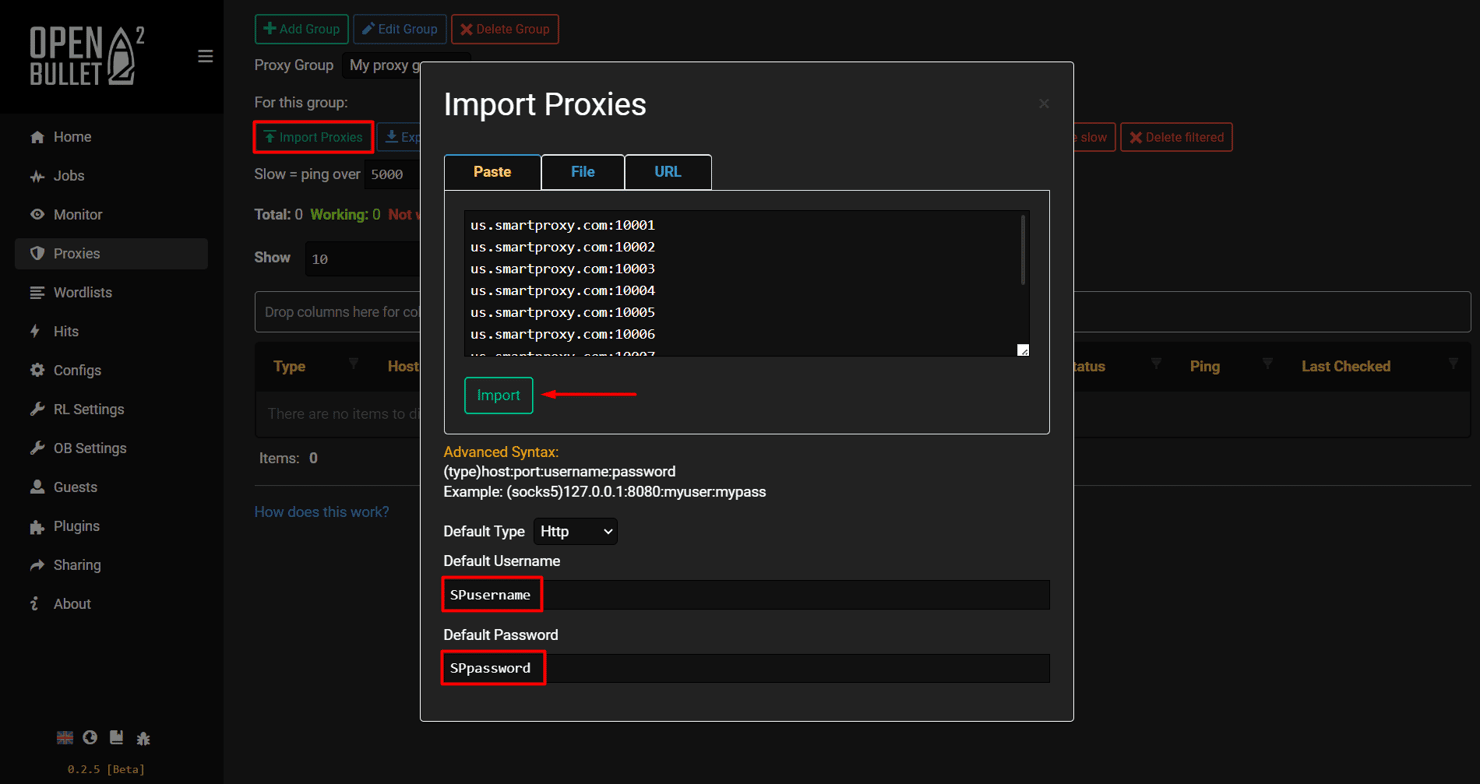
Integrating proxies with OpenBullet
Once you have your proxy endpoints configured, you can seamlessly integrate them into OpenBullet.
- On OpenBullet, navigate to the Proxies tab on the left panel.
- Click the Add Group button at the top, enter a name for your proxy group, and click Create.
- Click Import Proxies, and insert your proxy endpoints.
- If you’re using an authentication method that includes your username and password or have whitelisted your IP address, simply click Import. If you’ve copied only the proxy server address, click on Import and enter your username and password at the bottom of the window.
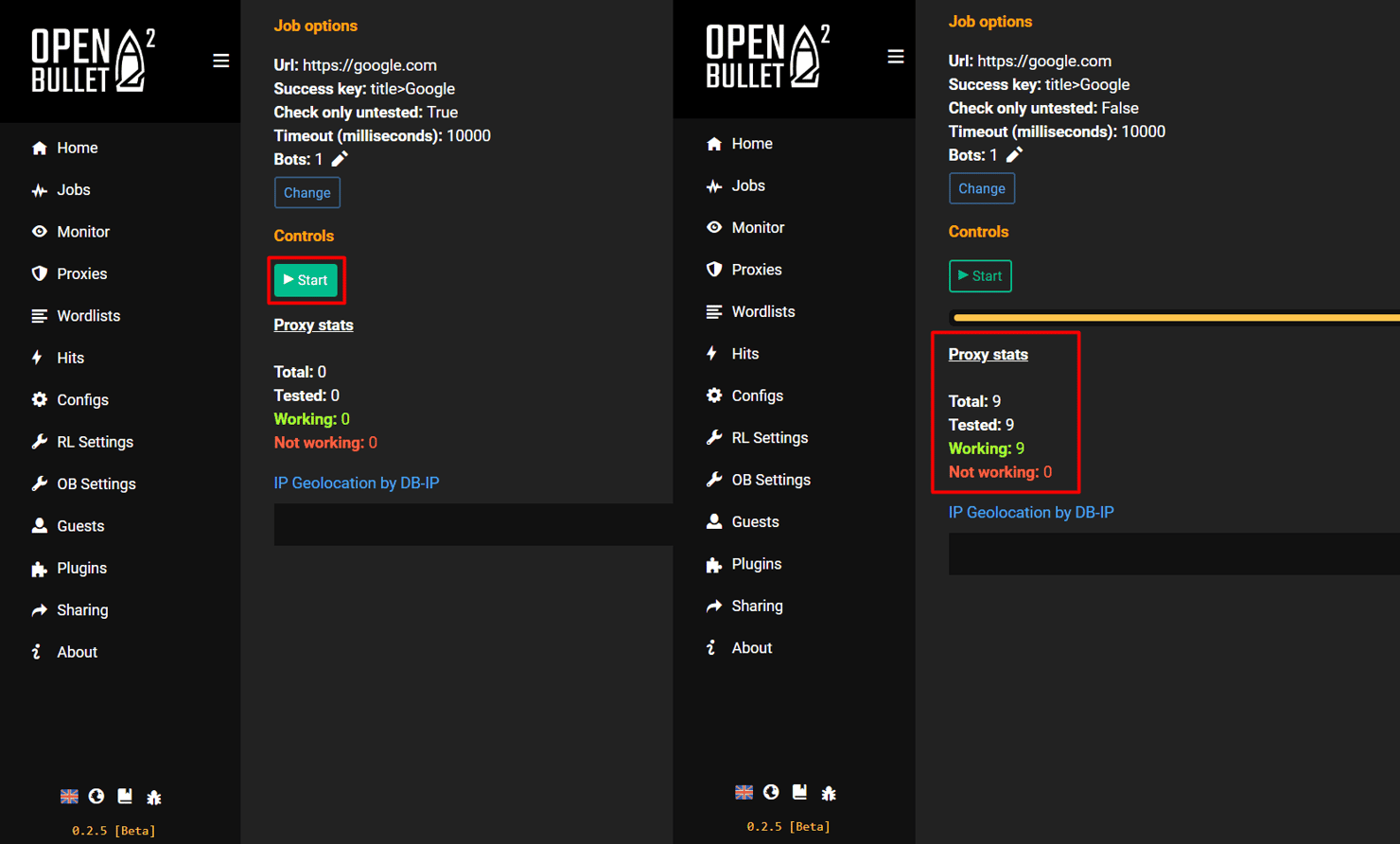
Checking your proxy connection
To make sure your proxy setup is working properly, follow these steps:
- On OpenBullet, Navigate to the Jobs tab on the left panel.
- Click the New button at the top and then the Proxy Check button.
- Choose the recently created Proxy group and click the Create Job button.
- Click the green Start button and wait for the job to finish to check if the proxies are working.
OpenBullet checks proxies by connecting to Google, which is a blocked target with some of our proxies. If you need access to a blocked site, contact our 24/7 tech support via LiveChat or verify your ID.
Configurations & Integrations
Easy Decodo proxy setup with popular applications and free third-party tools. Check out these guides to get started right away.
Reliable proxies at affordable prices
Pick a plan that suits you. Get ahead with unblockable and stable proxies.
100 GB
$1.5
/GB
Total:$450$148.5+ VAT billed monthly
Use discount code - NOIDEA67
With each residential proxy plan, you access:
115M+ ethically-sourced IPs in 195+ locations
HTTP(S) & SOCKS5 support
Continent, country, state, city, ZIP code, and ASN-level targeting
Rotating and sticky session options
<0.6s avg. response time
99.86% success rate
99.99% uptime
Seamless integration with scraping tools and bots
24/7 tech support
14-day money-back
SSL Secure Payment
Your information is protected by 256-bit SSL
What people are saying about us
We're thrilled to have the support of our 130K+ clients and the industry's best.
Attentive service
The professional expertise of the Decodo solution has significantly boosted our business growth while enhancing overall efficiency and effectiveness.
N
Novabeyond
Easy to get things done
Decodo provides great service with a simple setup and friendly support team.
R
RoiDynamic
A key to our work
Decodo enables us to develop and test applications in varied environments while supporting precise data collection for research and audience profiling.
C
Cybereg
Recognized by:
Explore our other proxy line products
What are proxies?
A proxy is an intermediary between your device and the internet, forwarding requests between your device and the internet while masking your IP address.
Residential Proxies
from $1.5/GB
Real, physical device IPs that provide a genuine online identity and enhance your anonymity online. Learn more
ISP Proxies
from $0.27/IP
IPs assigned by Internet Service Providers (ISPs), offering efficient and location-specific online access with minimal latency. Learn more
Mobile Proxies
from $2.25/GB
Mobile device based IPs offering anonymity and real user behavior for mobile-related activities on the internet. Learn more
Datacenter Proxies
from $0.020/IP
Remote computers with unique IPs for tasks requiring scalability, fast response times, and reliable connections. Learn more
Site Unblocker
from $0.95/1K req
A powerful application for all proxying activities offering dynamic rendering, browser fingerprinting, and much more. Learn more
Decodo Blog
Build knowledge on residential proxies, or pick up some dope ideas for your next project - our blog is just the perfect place.
Most recent
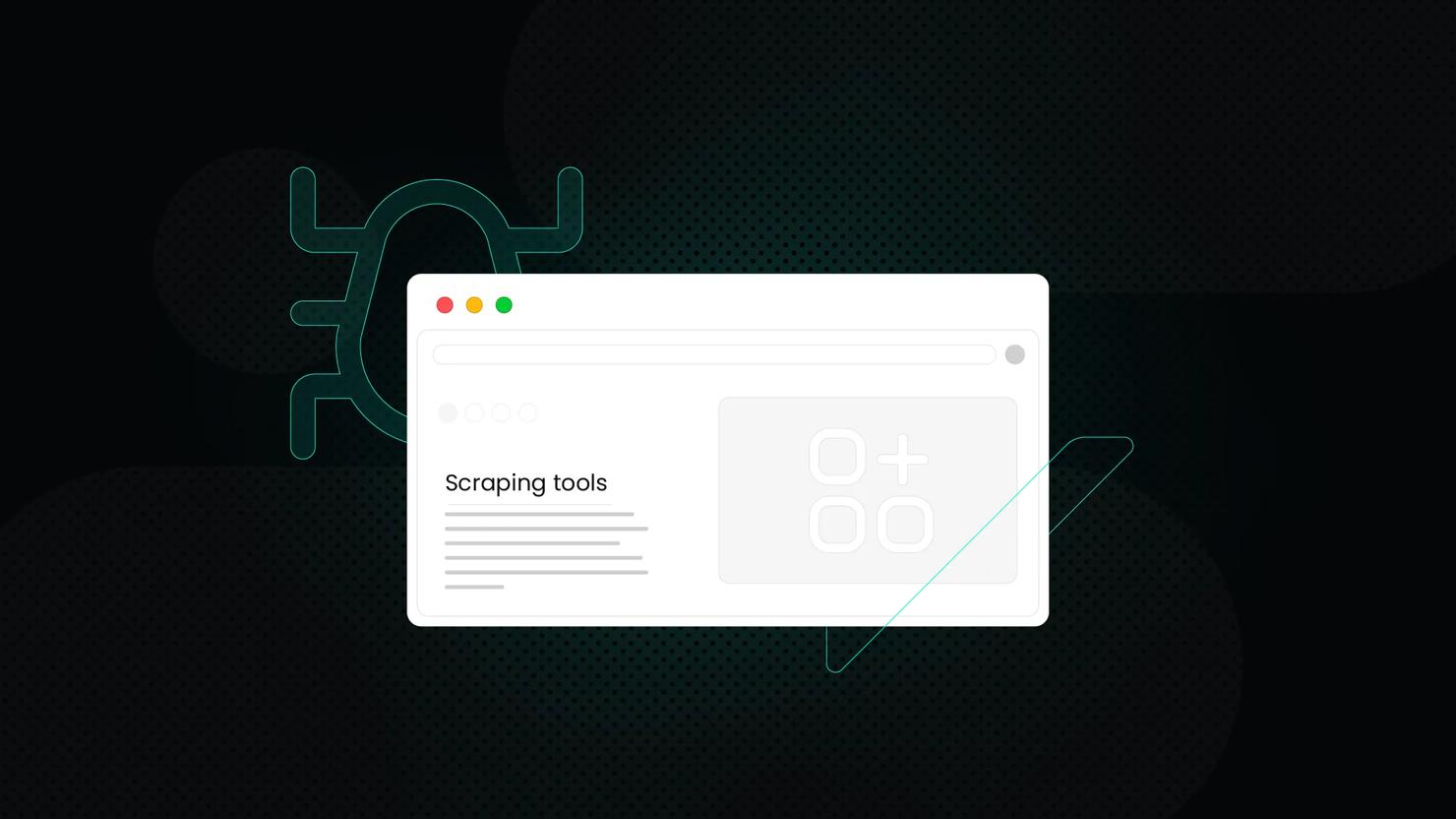
What is Data Scraping? Definition and Best Techniques (2026)
The data scraping tools market is growing significantly, valued at approximately $875.46M in 2026. The market is projected to grow more due to the increasing demand for real-time data collection across various industries.
Vytautas Savickas
Last updated: Jan 30, 2026
6 min read
Frequently asked questions
What is OpenBullet?
OpenBullet is a software application designed for testing and automating web services, providing a customizable framework to evaluate security and performance.
What is OpenBullet used for?
OpenBullet is primarily used for penetration testing, website performance monitoring, automating repetitive tasks, and other purposes.
Be aware that any tools mentioned in this article belong to a third party, not Decodo. Therefore, Decodo will not be responsible for any of the services offered by the third-party. Make sure to thoroughly review the third-party’s policies and practices, or do your due diligence, before using or accessing any of their services.
The Fastest Residential Proxies
Dive into a 115M+ ethically-sourced residential IP pool from 195+ locations worldwide.
14-day money-back option








